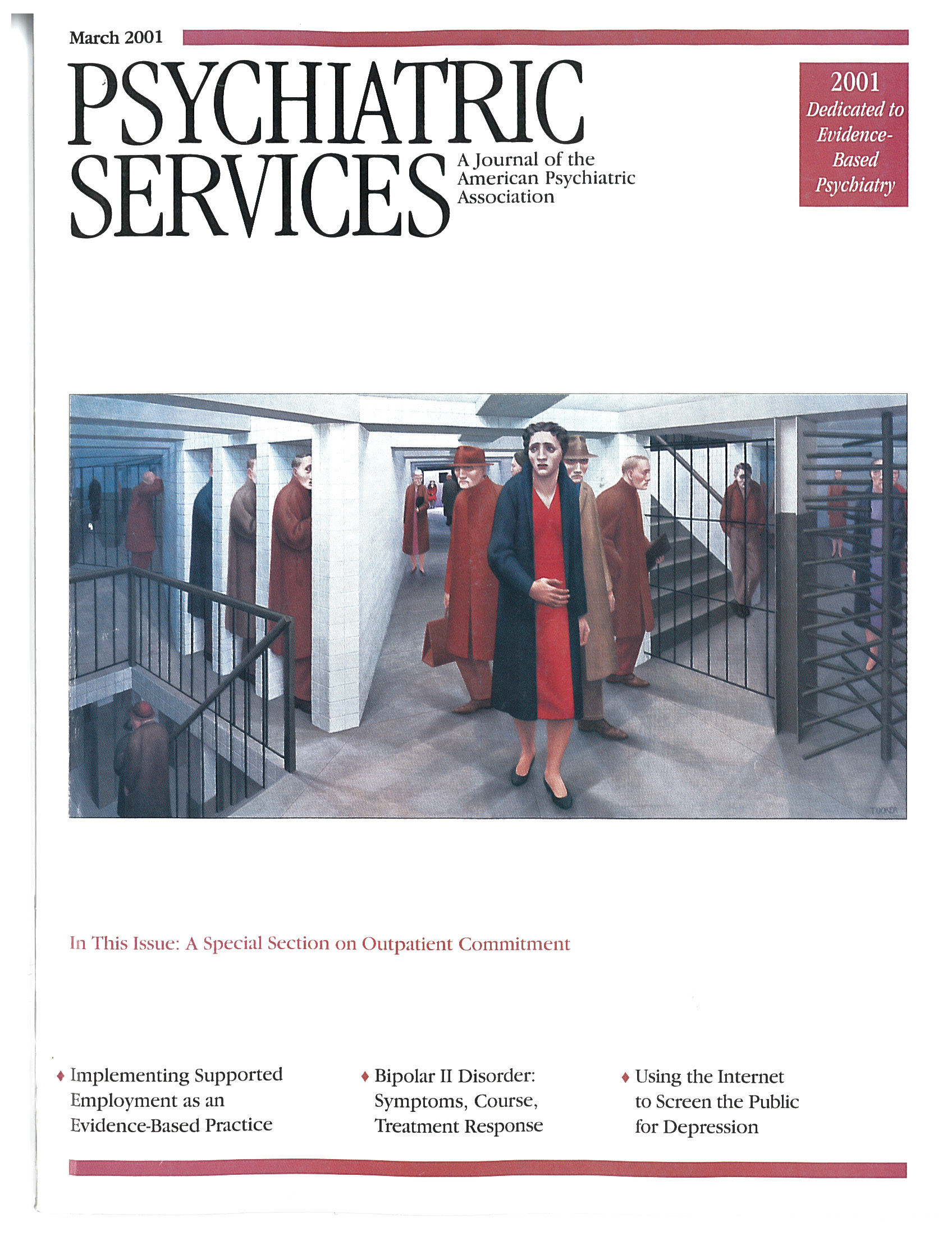This Month's Highlights
Debating Outpatient Commitment
This month's issue features a special section on involuntary outpatient commitment edited by Marvin S. Swartz, M.D., and John Monahan, Ph.D. In their introduction to the five articles in the section, the guest editors point out that many states have embraced outpatient commitment as a remedy for the most visible failures of community treatment, such as rare acts of violence by persons with mental illness. Two articles in the section describe randomized controlled studies in North Carolina and New York City. In the North Carolina study, a team of researchers led by Dr. Swartz showed that outpatient commitment is effective only when it is sustained for at least six months and combined with intensive community treatment (see page 325). The New York study, by Henry J. Steadman, Ph.D., and his colleagues, found no differences in major outcomes between patients who received outpatient commitment and those who did not (see page 330). In the third article in the section, E. Fuller Torrey, M.D., and Mary Zdanowicz, J.D., maintain that outpatient commitment is a form of assisted treatment that is necessary for a subgroup of patients who lack awareness of their illness and who do not adhere to medication regimens because of biologically based cognitive deficits (see page 337). In the fourth article, Michael Allen, J.D., and Vicki Fox Smith discuss the practical and legal dangers of outpatient commitment programs (see page 342). Finally, Paul S. Appelbaum, M.D., urges policy makers to think carefully about adopting outpatient commitment statutes. However, he argues that the weight of evidence and of clinical experience now favors efforts to implement reasonable statutory schemes, provided research on the effectiveness of outpatient commitment continues (see page 347). In a related commentary in Taking Issue, Jeffrey L. Geller, M.D., M.P.H., discusses the historical context of outpatient commitment and the questions that remain unanswered (see page 265).
Implementing Evidence-Based Practices
In 2001 a special focus of the journal is on helping community treatment programs implement evidence-based practices in the treatment of persons with severe mental illnesses. In this month's paper in the evidence-based practice series, Gary R. Bond, Ph.D., and his colleagues describe critical components of successful vocational programs that have been evaluated in studies showing the effectiveness of supported employment over traditional day treatment with vocational training. The authors discuss barriers to the implementation of supported employment and strategies for overcoming them (see page 313). In a related article, Deborah R. Becker, M.Ed., and her associates describe a statewide effort in Rhode Island to convert day treatment programs to supported employment programs. These investigators found that participants in the new supported employment programs were able to make the transition without untoward effects, and that a significant number of them gained competitive employment in the community (see page 351).
Diagnosing and Treating Bipolar II Disorder
Another focus of the journal this year is on the diagnosis and treatment of patients with various types of depression. Charles L. Bowden, M.D., has solicited a series of papers designed to help improve management of depression. Glenda M. MacQueen, M.D., Ph.D., and L. Trevor Young, M.D., Ph.D., contribute to the series with an article on bipolar II disorder, a distinct subtype of depression that is often misdiagnosed as unipolar depression or bipolar I disorder. Particular concerns are the high rate of suicide attempts among patients with bipolar II disorder and the need for more research on response to antidepressant medications (see page 358).
Treating Sexual Disorders Among Older Men
In the Practical Geriatrics column, Barbara Bartlik, M.D., and Marion Zucker Goldstein, M.D., provide an overview of age-related sexual dysfunction among men after midlife that complements a column in the June 2000 issue about older women's sexuality. They describe factors that may contribute to loss of sexual functioning in older couples. They summarize reasons for erectile dysfunction and several treatments. Mental health practitioners can do much to improve the quality of life of older patients by inquiring about sexual beliefs, behaviors, and symptoms, according to the authors (see page 291).
Briefly Noted…
• Researchers based at Johns Hopkins University School of Medicine describe an Internet-based program that screened a nationwide sample for depressive disorders (see page 362).
• The books section leads with reviews of four books on psychotherapy, including a slim but lyrical volume on the importance of listening carefully to patients' stories (see page 390).



